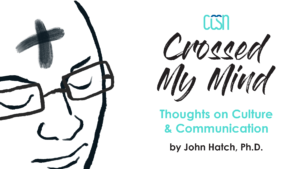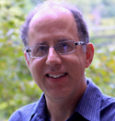 Column title: Crossed My Mind: Thoughts on Culture and Communication
Column title: Crossed My Mind: Thoughts on Culture and Communication
Column entry: Pentecost, Power, and Powery’s Becoming Human
By John Hatch, Ph.D.
Eastern University (retired)
CCSN Senior Fellow
Column Description: As Christians, we are called to have the mind of Christ. This goes against the grain of our social and cultural conditioning. We seek personal or political advancement; Christ seeks the lost and the least. We grasp for cultural ascendency; Christ descends to the cross of love. This column is dedicated to thinking about culture and communication under the sign of the cross.
May 2024 / April 2024 / March 2024 | February 2024(2) / February 2024(1) / January 2024 / December 2023 / November 2023 / October 2023 / July 2023 / June 2023 / May 2023 / April 2023 / March 2023 / February 2023 / January 2023 / December 2022 / November(2) 2022 / November 2022 / October 2022 / August-September 2022 / June-July 2022 / January 2022 / December 2021 / October-November 2021
May 2024
Pentecost, Power, and Powery’s Becoming Human
On Sunday, May 19, the Western church celebrated Pentecost. On this day, Christians remember the fulfillment of Christ’s words to his disciples before his ascension: “Do not leave Jerusalem, but wait for the gift my Father promised . . . . you will receive power when the Holy Spirit comes on you; and you will be my witnesses in Jerusalem, and in all Judea and Samaria, and to the ends of the earth.”[1] Scripture records how the Spirit eventually came like a mighty wind on the Jewish feast day of Pentecost, breathing forth an outburst of miraculous speech, as the disciples declared God’s wonders in the languages of all the nations from which pilgrims had come to worship.
This time last year, my column reflected on the connection between Pentecost and racial/ethnic reconciliation. Now, I’d like to offer further thoughts on this topic informed by Luke Powery’s important book, Becoming Human: The Holy Spirit and the Rhetoric of Race. Three topics converge in Powery’s discussion of Pentecost: the power behind racial division, the transformative power of the Holy Spirit, and the call to become fully human in Christ.
The False Power of Racialization
In the Genesis account, God creates one human race and disperses his children in every direction to become diverse nations, tribes, languages, and cultures. According to Scripture, all of them are made in the image of God. Biological research has shown that the differences among “red,” “yellow,” “black,” “white,” and so forth are minimal and superficial. Moreover, Powery notes, “boundaries between the so-called races are actually porous. Physical traits cross people groups.”[2]
Yet humans, enticed by the forbidden fruit of “the knowledge of good and evil,”[3] often judge outside groups to be evil, less good, or less human than themselves, and therefore deserving of segregation and subjugation. In doing so, we’re not simply recognizing the nature of things (as we suppose); we’re projecting our own fallen nature onto the world—that is, our lust for power, mastery, and self-exaltation.[4] As Powery explains, “Race is an idea, a social construct, not a biological reality, yet it has social power and shapes the world. This ideological construct racializes the world.”[5] In U.S. history, it has produced enslavement, legal segregation, land theft, even genocide. Often, however, it takes subtle forms: prejudice, indifference, neglect, inequitable resource distribution, etc. Either way, “racialization dehumanizes . . . To be racialized or raced is to be made a nonhuman, an object rather than a subject, not free to live as children of God created in the divine image.”[6]
Since it is an attack on the image of God, the ideology of race is animated by false spiritual powers. Highlighting this connection, Powery refers to the works of racialization as “racecraft.”[7] Like witchcraft, it promises mastery over others but ends up enslaving the would-be masters. As a result, “it is difficult to exorcise racialization and its power over society.”[8] In fact, “it must be confronted by another Spirit, the Holy Spirit of God, if humanity is to flourish.”[9]
True Power in the Holy Spirit
The same Spirit who brooded over the unformed world at the dawn of creation and breathed divine life into the “earth” (Hebrew: adama, or Adam) of humanity descended like a powerful wind upon Christ’s gathered disciples at Pentecost, alighting on each head like a candle-flame and filling each mouth with ecstatic speech in a different language.
And thus was born the Church: a multi-lingual body of believers with no ethnic insider/outsider distinctions and no dehumanizing walls of racialization. As Powery puts it, “Loosed tongues loosen the grip of those holding society captive through created, racialized hierarchies. These tongues set people free to be who God has called them to be, in all their diversity and beauty.”[10] Moreover, “Those speaking with this gift are not speaking in their native language but the language of the other. The Spirit causes the mother tongues of those who are different to be on the tongues of the other . . . creating a cross-cultural inhabitation.”[11] This miracle of ecstatic speech initiates a deeper process of opening our hearts and minds to God’s diverse people: “Ecstasy means ‘standing outside oneself’ . . . the Spirit helps one to get outside oneself, out of self-interests, in order to see others’ views and to get a wider perspective on God and life.”[12]
In Old Testament Hebrew and New Testament Greek, the word for spirit (ruach or pneuma, respectively) is the same as the word for breath or wind. Powery insightfully draws out the implications of this connection at Pentecost and beyond: “Breath, Spirit, is God’s grand equalizer. That is, life and breath are a gift for all flesh, regardless of raced status. Life and breath are given by a giving God. Breath comes and it came, suddenly. If there was no sudden irruption of wind, breath, spirit, then there would be no disruption of the status quo monochromatic, univocal, homogeneous existence. But God’s breath blows broadly and expansively across humanity and opens up the borders of human hearts toward each other.”[13] Being both omnipresent and invisible, God’s Spirit-breath “blows in all human bodies . . . It has no color, but it moves in all flesh, all bodies, even raced ones.”[14]
Becoming Human
To be human (from humus, meaning soil) is to be a bearer of God’s image in humble flesh. Whatever our skin hue, whether darker or lighter, we all come from the same dust, imprinted in our core with the same Image, in-spirited with the same Breath. To fulfill our God-given humanity, we must act as humble bearers of the divine Image. Yet we fall for the lie of inferior races and separating walls, and thus become less human in character. As Dr. Howard Thurman said in his eulogy for Martin Luther King Jr., ‘He was killed in one sense because [human]kind is not quite human yet.”[15]
Through the Spirit, Christ re-humanizes us. This process began with the incarnation, as the eternal Son was conceived in Mary’s womb by the Holy Spirit and “emptied himself, taking the form of a slave, being born in human likeness”[16]—thus becoming the “Last Adam” or ultimate Human.[17] It came to fuller light in his rabbinic ministry. Identifying himself as “the Son of Man” or Human One, Jesus touched lepers, ate with sinners, lifted up the downtrodden, and “went about doing good and healing all who were oppressed by the devil.”[18] He treated each individual not as an object or category, but as a fellow human being made in God’s image.
And then came the revelatory light of Holy Week: “being found in human form, he humbled himself and became obedient to the point of death—even death on a cross.”[19] Having suffered our inhumanity on the cross, Christ rose again, triumphing over death’s dehumanizing power; moreover, “God also highly exalted him and gave him the name that is above every name.”[20]
Yet the Lord of Lords remains fully human, Powery reminds us, and “his wounds from the crucifixion were not erased by the resurrection.”[21] Indeed, at the heart of God’s throne is “a Lamb, looking as if it had been slain.”[22]
This is the message that the disciples proclaimed in the power of the Spirit at Pentecost.[23] This is the King who says, “whatever you did for one of the least of these brothers and sisters of mine” (e.g., the impoverished, alien, sick, or imprisoned), “you did for me.”[24] This is the Spirit that overflowed the bounds of language and race in a humanizing flood, and opened the hearts of diverse believers to “sharing of resources, sharing of place, sharing worship, sharing food, and an overall sharing of life together as they looked out for each other’s needs.”[25] This is the challenge of Pentecost in our day.
We who claim Christ are called not only to proclaim his Lordship but to demonstrate it by walking in his Spirit, following the Son of Man as he goes forth, pours himself into outsiders, and suffers opposition from insiders for doing so. The Spirit-power he promised his disciples is the same power he demonstrated at the cross: the authority and strength to be God’s witness (martyros, martyr) “in Jerusalem, in all Judea and Samaria, and to the ends of the earth.”
As we empty ourselves of ethnic pride and racial judgment, we make room for the Spirit of Pentecost. In embracing the racial or ethnic outsider, both at home and abroad, we participate in the Spirit’s work of restoring humanity. For “the Spirit moves to humanize all people, especially those who have been dehumanized.”[26] By participating in this work, we become more humanized ourselves.
For to follow Christ is to become more fully human—God’s image-bearers in humble flesh.
* The views of any CCSN columnists are their own, and do not necessarily represent the views of the CCSN. We invite and embrace a wide range of views and critiques on important communication and cultural issues. The CCSN is a community of Jesus followers who study communication. We do not support or promote a particular social, political, or denominational agenda.
Notes
[1] Acts 1:4b & 8, New International Version.
[2] Luke A. Powery, Becoming Human: The Holy Spirit and the Rhetoric of Race (Louisville, KY: Westminster John Knox Press, 2022), p. 43.
[3] Genesis 2:17, 3:1-7.
[4] Genesis 3:5, Isaiah 14:12-15.
[5] Powery, Becoming Human, p. 3.
[6] Powery, Becoming Human, p. 15.
[7] Powery, Becoming Human, p. 50.
[8] Powery, Becoming Human, p. 5.
[9] Powery, Becoming Human, p. 50.
[10] Powery, Becoming Human, p. 72.
[11] Powery, Becoming Human, p. 58.
[12] Powery, Becoming Human, pp. 9-10.
[13] Powery, Becoming Human, pp. 55-56.
[14] Powery, Becoming Human, pp. 7-8.
[15] Howard Thurman, “Litany and Words in Memoriam: Martin Luther King, Jr.,” April 7, 1968, https://www.bu.edu/htpp/files/2017/06/1968-4-07-Litany-Words-in-Memoriam-of-MLK.pdf. Quoted in Powery, Becoming Human, p. 2.
[16] Philippians 2:7, New Revised Standard Version.
[17] 1 Corinthians 15:45.
[18] Acts 10:38b, New Revised Standard Version.
[19] Philippians 2:8, New Revised Standard Version.
[20] Philippians 2:9, New Revised Standard Version.
[21] Powery, Becoming Human, p. 112.
[22] Revelation 5:6, New International Version.
[23] Acts 2:14-36.
[24] Matthew 25:40, New International Version.
[25] Powery, Becoming Human, pp. 115-16.
[26] Powery, Becoming Human, p. 9.

